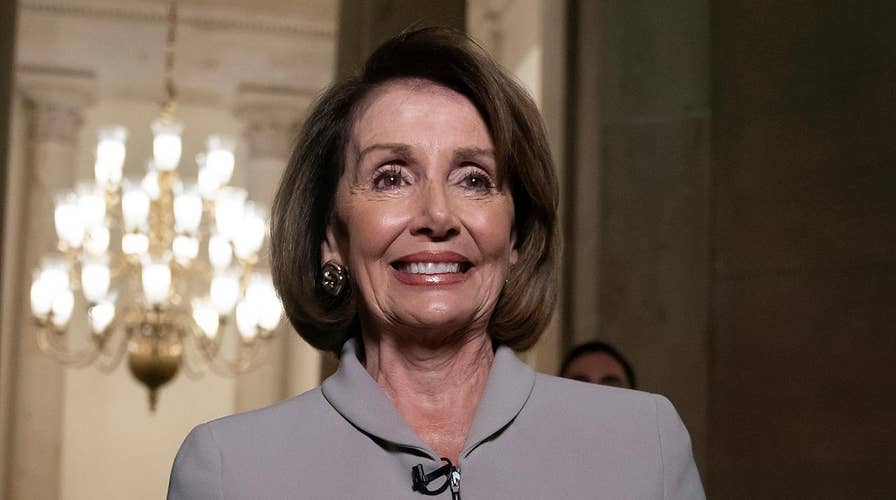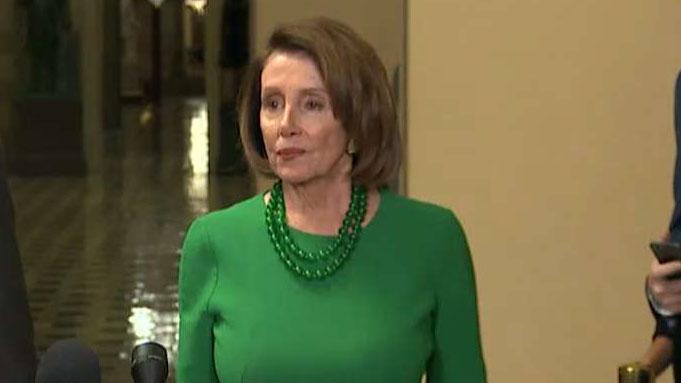Pelosi facing pressure from far-left freshmen Democrats who say they will vote against her House rules package
The new Congress kicks off with a party split over the PAYGO provision; Doug McKelway reports from Capitol Hill.
Incoming New York Democratic Rep. Alexandria Ocasio-Cortez affirmed on Wednesday that she will vote against a House rules package proposed by Democratic leader Nancy Pelosi, in a dramatic show of defiance that sets up yet another early showdown with her own party's establishment.
Ocasio-Cortez said she will join California Democratic Rep. Ro Khanna on Thursday -- the first day of the new Congress -- to oppose the so-called "pay-go" rule backed by Pelosi. That rule would require that any new mandatory spending for entitlements or tax cuts be offset by other separate revenue increases (such as tax hikes) or budget-cutting measures so that the new spending does not expand the federal defecit.
Pay-go would not apply to discretionary spending that is approved through the normal appropriations procedure. Last in effect in 2010, pay-go would replace the current so-called "cut-go" provisions, which require only that mandatory spending increases be matched with other cuts to mandatory spending.
The Pelosi-supported pay-go principle, Ocasio-Cortez charged in a Twitter post Wednesday, was a "dark political maneuver designed to hamstring progress on healthcare" and other legislation.
"We shouldn’t hinder ourselves from the start," she added.
CLICK HERE TO GET THE FOX NEWS APP
Pelosi deputy chief of staff Drew Hammill fired back shortly afterward, tweeting: "A vote AGAINST the Democratic Rules package is a vote to let [Director of the Office of Management and Budget (OMB)] Mick Mulvaney make across the board cuts, unilaterally reversing Democratic initiatives and funding increases."
Hammill argued that federal law already provides for a kind of pay-go mechanism that requires OMB to offset the "cost of deficit-increasing legislation by forcing indiscriminate, across-the-board cuts in federal mandatory spending." Without enacting the separate pay-go rule provided by the Pelosi-backed rules package, Hammill suggested, the Trump administration could simply overrule congressional Democrats. (Mulvaney has also been named acting White House chief of staff, in addition to his OMB duties.)
A study released in July by the Mercatus Center at George Mason University said Ocasio-Cortez's proposed 'Medicare for all' solution would increase government health care spending by $32.6 trillion over 10 years, and require historic tax increases. The study's author has said both Ocasio-Cortez and Vermont Independent Sen. Bernie Sanders, a frequent ally of the incoming congresswoman, had misinterpreted his study when they argued that Medicare for all would actually save money.
So far, only Ocasio-Cortez and Khanna have publicly come out against the rules package that includes the pay-go provision. A total of 218 representatives must vote 'yes' to pass the new rules, meaning that ordinarily, 18 Democrats would need to vote against the rules package in order for it to fail.
However, one Republican has said he will support Pelosi's package, which would raise the needed number of Democratic defectors to 19 to kill the proposal.
HOW MUCH WILL OCASIO-CORTEZ'S MEDICARE-FOR-ALL PLAN REALLY COST TAXPAYERS?
The dust-up came nearly two months after Ocasio-Cortez, moments after arriving on Capitol Hill for freshman orientation, joined an impromptu sit-in outside Pelosi’s office to push for congressional action on climate change.
“We need to tell her that we’ve got her back in showing and pursuing the most progressive energy agenda that this country has ever seen,” Ocasio-Cortez said while standing in the middle of a group of around 200 protestors holding signs reading “Green Jobs For All.”
Although Pelosi said in a statement afterward that "we welcome the presence of these activists," the episode highlighted a growing rift between establishment Democrats and up-and-coming politicians such as Ocasio-Cortez and Khanna, who each unseated longtime party incumbents.
Other rule changes proposed by Pelosi and unveiled Sunday would eliminate the supermajority requirement to pass federal income tax changes, and make it easier to suspend the debt ceiling. The rules package also would remove term limits from committee chairmanships and establish a climate-change committee.
Additional elements to the rules package include ethics reforms that preclude congressional members and their staff from serving on corporate boards, as well as the revival of a rule that all legislation must be made available at least 72 hours before a vote is held.






